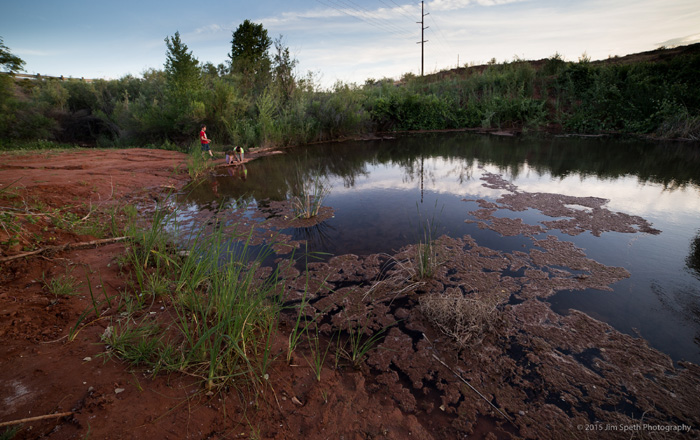 |
| Image: Jim Speth |
Written by Marcos Camargo
A citizen-led proposal to preserve the warm springs in Washington City, commonly known as “the Boilers,” was defeated Wednesday, June 10, in a 3-2 vote by the Washington City council. The discussion drew a standing-room-only crowd as citizens and council members on both sides of the issue engaged in an impassioned debate over the future of the springs, with the main issue on the table being whether to lease 16 acres of city-owned property surrounding the springs to the nonprofit group Boiling Springs Ecoseum and Desert Preserve.
The group’s proposal outlined a development project that would have restored the unique habitat surrounding the Boilers while also preserving public access and providing educational opportunities. However, because Boiling Springs Ecoseum and Desert Preserve lacks the funds to purchase the property outright, the initiative hinged on the city donating the land through a 99-year lease at a cost of one dollar per year. The proposed agreement would have required all other funding to be raised by the nonprofit.
Preservation of the Boilers has been pushed by citizens concerned that the property may be put on the market and sold to the highest bidder, with fears that this could lead to a development firm purchasing the property to build commercial or residential real estate on top of the sensitive ecosystem.
Matt Ence, the attorney representing Boiling Springs Ecoseum and Desert Preserve, answered questions from councilman Ronald Truman regarding plans for funding goals and contractual “off-ramps” the city could take should those goals not be met.
Ence explained how the proposal was broken down into stages the Boiling Springs group would have needed to meet for the project to have continued.
“A couple of those early stages have to do with things such as development of this development agreement,” said Ence. “As soon as this is all approved by the city, then we go into the next step … negotiation of the ground lease, which will essentially secure the property so the project can go forward. There will have to be construction plans presented and approved by the city. There are actually financial thresholds that have to be met by the Boiling Springs group in order for it to go forward.
“Those are some examples of stages in the early process where if the city at any time says, ‘Look, this just isn’t working. We don’t feel you have the capacity to go forward. You’re not meeting the thresholds that are required in the development agreement,’ then the city can … terminate our lease.”
The Washington City Council then heard from Nicole Warner, the president of the Boiling Springs Ecoseum and Desert Preserve. Warner thanked the council for the opportunity to collaborate in designing the proposal. She said the different opinions expressed by members of the community show the importance of the springs.
“I think this is the perfect platform for people to come together,” said Warner. “It really becomes a model for what we hope to achieve with the Boiling Springs Ecoseum and Desert Preserve: a platform to promote better understanding, not just between members of our own community but members of the world that come to visit our region … The historic value of the boilers, the completely unique ecosystem that it represents, the water source that it has been and continues to be, and the opportunities that it represents for education and cultural arts, to me, speak to the absolute imperative to preserve and protect them.”
Warner also addressed concerns about funding the project.
“This is a project that’s really very big. It’s really very ambitious,” she said. “It’s easy to get intimidated by it. But it’s also something that we can do in stages and that we can do in chunks. If you read through the documents, our intention has never been to outpace our ability to pay for it … We will not break ground unless we already have 80 percent of the funding already in place.”
Among council members, the proposal received its greatest endorsement from Kress Staheli. Staheli focused on the degradation of the Boilers while under management by the city and encouraged a partnership with Boiling Springs Ecoseum and Desert Preserve to restore the springs to the community centerpiece they once were.
Speaking of the decline of the springs that forced the city to fence off the area for several years, Staheli said, “What did we learn? We learned that we as a city don’t have a clue about protecting unique and delicate habitats. We also learned that if we keep pushing sand on the banks, there will be no more water to send downstream… A park alone does not do [the springs] justice, and we have seen that the city does not have what it takes to care for it. Since when is the government the solution to local problems? Last time I checked, the majority of us agree that private citizens do a much better job.”
Council member Garth Nisson said he supports a regular park but opposes a joint venture between the city and a private organization.
“Fundamentally, I don’t think any city should have an agreement with a corporation—nonprofit or not—especially an open-ended one that seems one-sided,” he said.
Nisson also voiced concern that if the project got started without secured funding, the city may be pressured to turn to tax revenue to keep the venture afloat.
Despite Staheli’s efforts to convince the rest of the council to move ahead with the proposal, the final vote ended with council members Kress Staheli and Ronald Truman voting in favor of the proposal while Jeff Turek, Thad Seegmiller, and Garth Nisson voted against the plan.
Following the vote, Seegmiller made a motion to end negotiations with Boiling Springs Ecoseum and Desert Preserve as presented in the Wednesday’s proposal. The motion passed by a 3-2 vote that mirrored the split among council members over the proposal. The motion to end negotiations eliminates future initiatives to build an ecoseum and means a new proposal will have to be brought forward for the Washington City Council to consider.
In response to the proposal’s defeat, Warner said she and her group remain optimistic about the future of a Boiling Springs preserve.
“I didn’t get the sense that really any of the council members necessarily want to squelch the idea,” Warner said, “but the question became, does the city want to act in partnership with a nonprofit organization? And tonight they voted ‘no,’ but that doesn’t mean that in the future they might not change their minds … From our perspective, as we’ve met in committee, we’ve been reticent in the past to go out and fundraise because we felt it was disingenuous on our part to do that without an agreement in place. I think it is clear that there are strong elements in the city that have a desire for us to purchase [the land] outright. So I think that we are well within our right and in our good conscience to begin earnestly campaigning to receive funds in order to go forward and to be prepared… to purchase the property.”
In response to the concerns raised by Councilman Nisson that the proposal could potentially be a burden on Washington City taxpayers, Warner said one of the reasons Boiling Springs Ecoseum and Desert Preserve wanted to structure their development agreement the way they did was because they felt very strongly that it was the most ideal way preserve ownership by the citizens as opposed to private organizations.
Warner also said that she believes the Boilers falls under the definition of an “exiting feature” according to section 404 of the Clean Water Act. This would put the springs under the jurisdiction of the federal government, and any structural changes made to the springs would have to be authorized by the U.S. Army Corps of Engineers through a permitting process. A permit would be required for changes such as bushing sand along the banks of the pond, something the city began to do before being stopped pending a jurisdictional review.
According to Patricia McQueary of the Army Corps of Engineers, the review process is already underway. McQueary said Washington City has hired a private consultant to delineate the waters around the springs. The Army Corps of Engineers and the Environmental Protection Agency will use this information to determine what areas around the springs fall under federal jurisdiction and what areas do not.
McQueary also said that any structural alterations to the springs and surrounding areas could have an environmental impact on the wetland habitat, regardless of whether the changes are made under federal oversight or not.
“There are some fringe wetlands around the pond that could be impacted, if [the city] were to go in and do some work on it,” said McQueary.
Once the report is officially filed with the Army Corps of Engineers, the review and permitting process could take as little as five months to complete.
Subscribe for FREE to get our weekly Sunday Edition email, just signup in the NEWSLETTER box on the right –>




